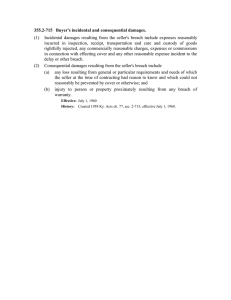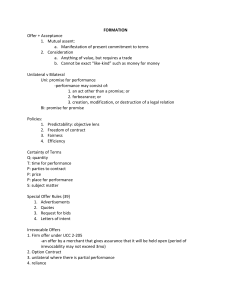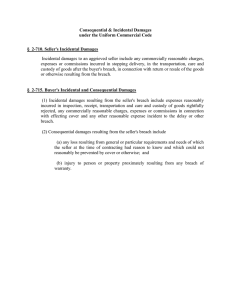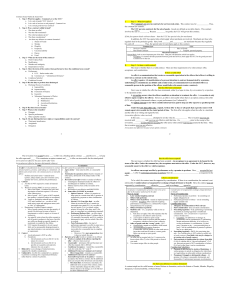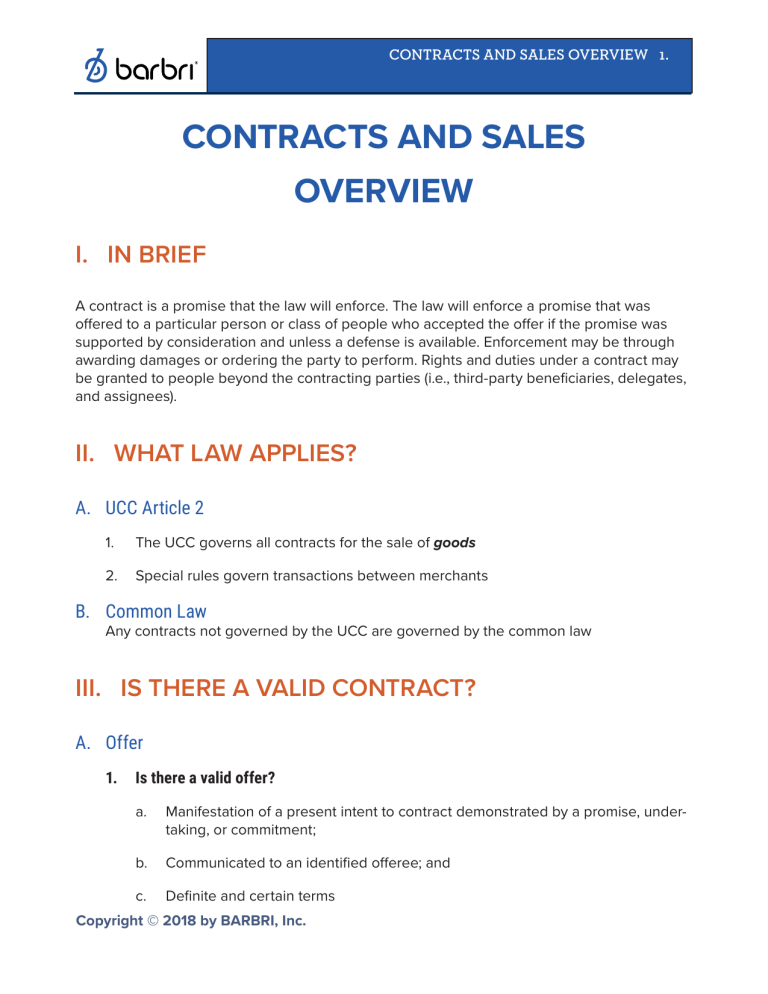
CONTRACTS AND SALES OVERVIEW 1. CONTRACTS AND SALES OVERVIEW I. IN BRIEF A contract is a promise that the law will enforce. The law will enforce a promise that was offered to a particular person or class of people who accepted the offer if the promise was supported by consideration and unless a defense is available. Enforcement may be through awarding damages or ordering the party to perform. Rights and duties under a contract may be granted to people beyond the contracting parties (i.e., third-party beneficiaries, delegates, and assignees). II. WHAT LAW APPLIES? A. UCC Article 2 1. The UCC governs all contracts for the sale of goods 2. Special rules govern transactions between merchants B. Common Law Any contracts not governed by the UCC are governed by the common law III. IS THERE A VALID CONTRACT? A. Offer 1. Is there a valid offer? a. Manifestation of a present intent to contract demonstrated by a promise, undertaking, or commitment; b. Communicated to an identified offeree; and c. Definite and certain terms Copyright © 2018 by BARBRI, Inc. 2. CONTRACTS AND SALES OVERVIEW 2. Has the offer been terminated? a. Lapse of time—must accept within specified time period or, if none, within reasonable time b. Revocation—words or conduct of the offeror terminating the offer c. d. 1) Revocation is effective when received by offeree 2) Irrevocable offer: a) Merchant’s firm offer under UCC b) Option contract—offeree gave consideration to hold open offer c) Detrimental reliance Rejection—words or conduct of the offeree rejecting the offer 1) Rejection effective when received by offeror 2) Counteroffer acts as rejection Termination by operation of law when: 1) Destruction of subject matter of the contract 2) Supervening illegality of subject matter of contract 3) Death or insanity of either party B. Acceptance 1. Unequivocal acceptance a. Common law—acceptance of each and every term of the offer (mirror image rule) b. UCC—an acceptance that adds terms to the offer is valid 1) 2. Between merchants, the additional terms become part of the contract unless they materially alter the contract, the offeror objects, or the offer is limited to its terms (“battle of the forms”) Methods of acceptance a. UCC—reasonable means CONTRACTS AND SALES OVERVIEW 3. 3. b. Unilateral contract—performance c. Bilateral contract—promise or performance Acceptance effective upon dispatch (mailbox rule) a. Limitation—offeror opts out; rejection sent first C. Consideration 1. Bargained-for exchange (not a gift), and 2. Detriment to promisee or legal benefit to promisor (courts focus on detriment) a. Adequacy generally irrelevant b. Past consideration generally invalid (preexisting duty rule) 1) 3. Exceptions: a) Written promise to pay time-barred debt b) New or different consideration promised c) Promise ratifying a voidable obligation (e.g., minor ratifying upon reaching age of majority) d) Compromise of honest dispute e) Unforeseen circumstances make modification fair and equitable (modern rule) or rise to the level of impracticability (majority view) f) Good faith modification under Article 2 Substitutes for consideration—promissory estoppel and detrimental reliance D. Must Be No Defenses to Formation or Enforcement 1. Mistake a. Unilateral mistake—contract is voidable if nonmistaken party knew or should have known of mistake b. Mutual mistake—contract is voidable by adversely affected party if: 1) Mistake concerns basic assumption on which contract was made; 4. CONTRACTS AND SALES OVERVIEW c. 2) Mistake has material effect; and 3) Party seeking avoidance did not assume risk Ambiguous terms—one party aware of ambiguity = contract; neither party or both parties aware of ambiguity = no contract 2. Fraud and misrepresentation (includes concealment and nondisclosure) 3. Illegality of consideration or subject matter 4. Incapacity—infancy, mental incapacity, intoxication, duress, and undue influence 5. Statute of Frauds—certain contracts must be in writing, signed by the party to be charged (“MY LEGS” ) a. Marriage—when marriage is consideration for promise (e.g., “If you marry my son, I will buy you a car”) b. Year—promises that cannot be performed within one year from date of contract c. Land—promises creating interests in land (e.g., leases, easements, fixtures, mineral rights, mortgages) d. Executors and administrators—promises to pay estate debts from own funds e. Goods—contracts for sale of goods for a price of $500 or more 1) f. 6. Exceptions—specially manufactured goods, goods accepted or paid for Suretyship—promise to answer for debt of another Unconscionability—court may refuse to enforce to avoid unfair terms (e.g., contracts of adhesion) IV. WHAT ARE THE TERMS OF THE CONTRACT? A. Rules of Contract Construction General rules: contracts are construed as a whole, words are generally given their ordinary meaning, written or typed terms prevail over printed, custom and usage in business and locale is considered, court will try to find contract valid, and ambiguities are construed against the contract’s preparer CONTRACTS AND SALES OVERVIEW 5. B. Parol Evidence Rule When parties intend that a writing is the final expression of their bargain, no prior (oral or written) or contemporaneous (oral) expressions are admissible to vary the terms of the writing 1. 2. Integration—final and complete expression a. If incomplete (partial integration), evidence admitted to supplement b. Merger clause (states agreement is complete on its face) is evidence of full integration Evidence outside scope of the rule may be admitted: a. Evidence concerning validity (e.g., formation defects, conditions precedent) b. Evidence used to interpret (words used are uncertain or ambiguous) c. Evidence showing true consideration paid d. Evidence in action for reformation C. Article 2 Provisions 1. “Gap-fillers” If missing, Article 2 provides: price (reasonable at time of delivery), place of delivery (seller’s business), time of shipment (reasonable), time for payment (receipt of goods), and assortment (buyer’s option) 2. Delivery Terms and Risk of Loss a. b. Noncarrier cases 1) Merchant seller—risk passes to buyer upon taking physical possession 2) Nonmerchant seller—risk passes upon tender of delivery Carrier cases 1) Shipment—risk passes on delivery to carrier 2) Destination—risk passes on tender at destination 3) F.O.B.—risk passes on delivery to F.O.B. location 6. CONTRACTS AND SALES OVERVIEW 3. Warranties in sales of goods a. b. c. Types—title, against infringement, merchantability, fitness, express 1) Implied warranty of merchantability (goods are fit for ordinary purpose) implied in every contract by merchant of goods of kind sold 2) Implied warranty of fitness for particular purpose implied whenever any seller has reason to know particular purpose for which goods to be used and that buyer is relying on seller’s skill and judgment to select goods, and buyer does in fact rely Disclaimers 1) Title—specific language or circumstances putting buyer on notice that seller is not claiming title 2) Merchantability a) Specific disclaimer must mention “merchantability” and, if in writing, must be conspicuous b) Also can be disclaimed by “as is,” refusal to examine, or course of dealing 3) Fitness for a particular purpose—only by conspicuous writing or general disclaimer (“as is,” refusal to examine, course of dealing) 4) Express—disclaimer usually not given effect Damages—difference between goods tendered and as warranted D. Modification of Terms 1. Common law a. Under general contract law, additional consideration needed b. Modern view permits modification without consideration if due to circumstances that were unanticipated by the parties when the contract was made and it is fair and equitable c. Written contract can be modified orally even if contrary provision CONTRACTS AND SALES OVERVIEW 7. 2. UCC Article 2 a. No consideration needed so long as in good faith b. Must be in writing if, as modified, contract is for $500 or more c. Gives effect to provisions prohibiting oral modification V. HAS PERFORMANCE BEEN EXCUSED OR DISCHARGED? A. Has the Condition (Precedent, Concurrent, or Subsequent) Been Excused? 1. Hindrance or failure to cooperate 2. Breach of contract 3. Anticipatory repudiation—party unequivocally indicates he will not perform before time of performance 4. Prospective inability or unwillingness to perform—doubts as to party’s performance 5. Substantial performance 6. Divisibility of contract 7. Waiver or estoppel B. Has the Absolute Duty Been Discharged? 1. Performance or tender of performance 2. Occurrence of condition subsequent 3. Illegality of subject matter after contract was made 4. Impossibility, impracticability, or frustration of purpose 5. Rescission of contract 6. Modification of contract 8. CONTRACTS AND SALES OVERVIEW 7. Novation (replacing parties) or substituted contract (replacing contract) 8. Accord and satisfaction VI. HAVE THE TERMS OF THE CONTRACT BEEN BREACHED? A. Material or Minor Breach (Common Law) 1. Minor breach—obligee gains the substantial benefit of bargain so aggrieved party must perform, but right to damages 2. Material breach—obligee does not gain substantial benefit of bargain so no duty to perform, immediate right to damages and other remedies B. Perfect Tender Rule (UCC Article 2) If goods or delivery fail to conform to contract in any way, buyer generally may reject all, accept all, or accept any commercial units and reject rest VII. WHAT REMEDIES ARE AVAILABLE IF THE CONTRACT HAS BEEN BREACHED? A. Specific Performance If legal remedy (damages) is inadequate, court may order breaching party to perform (land and rare or unique goods) B. Damages Damages can be recovered only to the extent they can be proved with reasonable certainty and could not be avoided with reasonable effort 1. 2. Compensatory a. Expectation damages (“benefit of the bargain”) b. Consequential damages available only if reasonably foreseeable Liquidated damages if: a. Actual damages difficult to calculate at the time of contracting b. Amount is a reasonable forecast of the likely damages (not punitive) CONTRACTS AND SALES OVERVIEW 9. 3. Sale of goods contracts (Article 2) a. b. Buyer’s damages 1) Cover (difference between contract price and cost of replacement goods) 2) Difference between contract price and market price 3) Warranty damages (if accepted nonconforming goods) 4) Consequential damages (if seller knew of buyer’s needs) Seller’s damages 1) Difference between contract price and resale price 2) Difference between contract price and market price 3) Lost profits (lost volume seller) 4. Land sale contracts—difference between the contract price and fair market value 5. Employment contracts 6. a. Employer breach—full contract price b. Employee breach—cost to replace employee Construction contracts a. b. 7. Breach by owner 1) Before construction—builder’s prospective profits 2) During construction—contract price minus the cost of completion 3) After completion—full contract price plus interest Breach by builder 1) Before or during construction—cost of completion plus compensation for delay 2) Late completion—value of lost use Avoidable damages—nonbreaching party has duty to mitigate 10. CONTRACTS AND SALES OVERVIEW C. Restitution Prevents unjust enrichment; measure is value of benefit conferred D. Rescission and Reformation 1. Rescission—contract voidable/rescinded if mutual mistake of material fact, unilateral mistake that other party knew or should have known or extreme hardship, misrepresentation of material factor, or duress, undue influence, illegality, incapacity, or failure of consideration 2. Reformation—writing changed to conform to parties’ original intent if mutual mistake, unilateral mistake and party knows of it and does not disclose, or misrepresentation VIII. DO ANY THIRD PARTIES HAVE RIGHTS OR RESPONSIBILITIES UNDER THE CONTRACT? A. Third-Party Beneficiaries 1. Only intended beneficiaries have rights under contract 2. Vesting of third party’s rights (no modification without third party’s consent after vesting)—third party’s rights are vested if he: a. Manifested assent; b. Brought suit to enforce the promise; or c. Materially changed position in justifiable reliance 3. Promisor can raise against the third party any defenses he could raise against promisee 4. Third-party beneficiary v. promisee (if promisor fails to perform): 5. a. Donee beneficiary—may not sue promisee unless detrimental reliance b. Creditor beneficiary—may sue promisee on underlying obligation Third-party beneficiary may sue both the promisor and promisee but may obtain only one satisfaction B. Assignment of Rights—Transfer of Rights Under Contract CONTRACTS AND SALES OVERVIEW 11. 1. All contract rights are assignable unless assignment materially alters the obligor’s duty or risk or it is prohibited by law a. Contract provision prohibiting assignment bars only delegation of duties 2. Revocability—assignments for value are irrevocable (includes preexisting debt) 3. Assignor’s warranty liability to assignee—assignor impliedly warrants: 4. a. He has made no prior assignment of the right b. The right is not subject to limitations or defenses other than those disclosed or apparent c. He will do nothing to defeat or impair the right Successive assignments of same right a. Revocable assignments—subsequent assignee prevails b. Irrevocable assignment—first assignee has priority C. Delegation of Duties—Transfer of Contractual Duties 1. 2. Duties that cannot be delegated: a. Those involving personal judgment or skill b. Those involving special trust in delegator (e.g., doctor, lawyer) c. Those restricted by contract d. Those the performance of which by a delegate materially changes the obligee’s expectancy Liability of parties: a. Delegator remains liable b. Delegate liable if he assumes the duty c. Assignment of “contract” or “rights under the contract” construed to include delegation and assumption of duties
